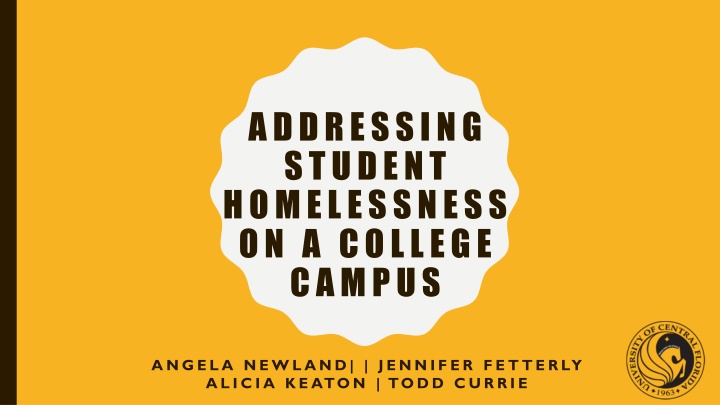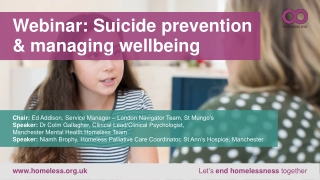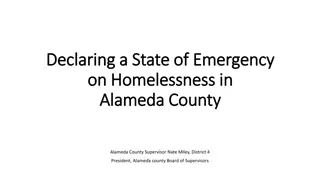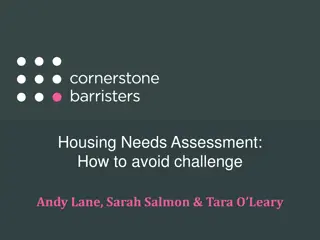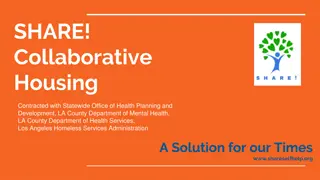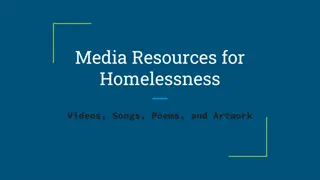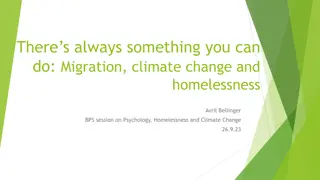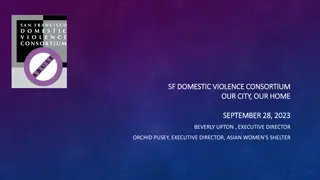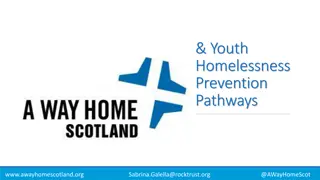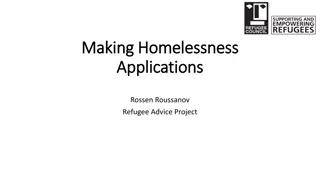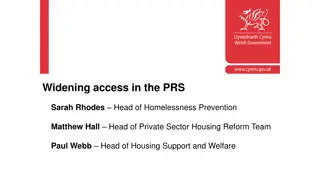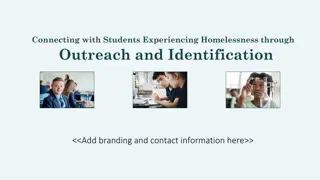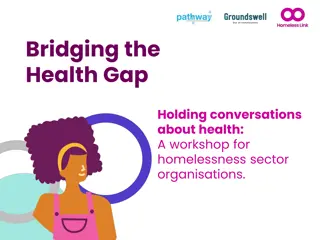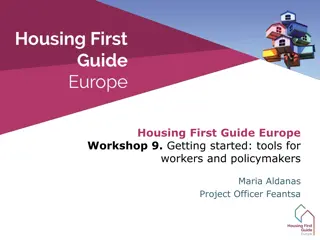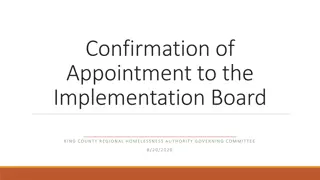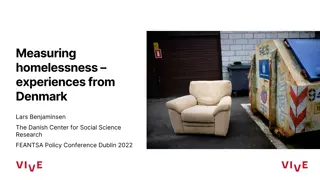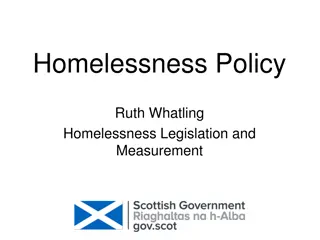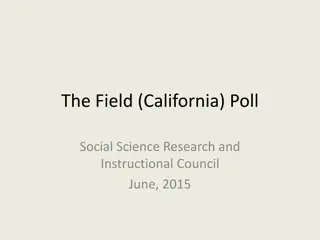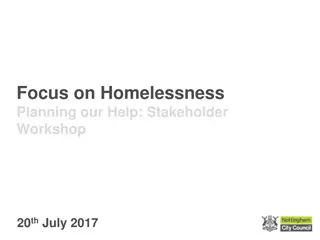Addressing Student Homelessness on College Campuses
Explore the challenges faced by homeless students on college campuses and discover insights from research, theories, and practical initiatives to support these students. Gain an understanding of the definition of collegiate homelessness, statistics, research findings, and successful programs implemented in universities to address this pressing issue.
Uploaded on Sep 27, 2024 | 1 Views
Download Presentation

Please find below an Image/Link to download the presentation.
The content on the website is provided AS IS for your information and personal use only. It may not be sold, licensed, or shared on other websites without obtaining consent from the author.If you encounter any issues during the download, it is possible that the publisher has removed the file from their server.
You are allowed to download the files provided on this website for personal or commercial use, subject to the condition that they are used lawfully. All files are the property of their respective owners.
The content on the website is provided AS IS for your information and personal use only. It may not be sold, licensed, or shared on other websites without obtaining consent from the author.
E N D
Presentation Transcript
ADDRESSING STUDENT HOMELESSNESS ON A COLLEGE CAMPUS ANGELA NEWLAND| | JENNIFER FETTERLY ALICIA KEATON | TODD CURRIE
INTRODUCTIONS Angela Newland, MSW | Care Manager, Student Care Services Jennifer Fetterly| Assistant Controller, Student Account Services Alicia Keaton | Director, Student Financial Assistance Todd Currie| Former AmeriCorps VISTA
OVERVIEW Introduction of student homelessness Theory and Research Programs and Initiatives How to help these students at your institution Panel questions
DEFINITION A student who lacks a fixed, regular, and adequate nighttime residence or whose primary nighttime residence is a public or private shelter designed to provide temporary residence for individuals intended to be institutionalized, or a public or private place not designed for, or ordinarily used as, a regular sleeping accommodation for human beings (s. 1009.25(1)(f), F.S.) Examples include temporary shelter, living in a car, couch surfing
COLLEGIATE HOMELESSNESS 58,000 indicated homelessness on FAFSA nationwide (2013) UCF FAFSA: 2014-15: 16 2015-16: 23 UCF Homeless Student Committee
RESEARCH FACE TO FACE AND ONLINE SURVEYS CONDUCTED 2015-2016 DIRECTED AT UCF STUDENTS VIA SOCIOLOGY DEPARTMENT
RESEARCH Only 17.2% (5) of currently homeless students have sought out UCF resources to assist them
REVIEW OF PROGRAMS California State University Long Beach: Research, Provost Support Student Emergency Intervention Program (Meals, Housing, Emergency Grant) Florida International University: Fostering Panther Pride Program: College Coach, Community Partnerships, First Gen, Research Kennesaw State University: CARE Center. Pantry, Scholarships, Case Management, Events
UCF STUDENT SUPPORT Student Care Services Case Management Homeless Student Committee AmeriCorps VISTA Bus Passes & Dining Scholarships Campus-wide Awareness & Programming Connecting to campus and community resources Housing and Residence Life & Neighborhood Relations and Safety Education Knights Helping Knights Pantry Emergency Funding sources
AMERICORPS VISTA AMERICORPS VISTA Government program that focuses on helping overcome poverty in United States 1 year commitment Perform in-direct service to help build capacity of organization AmeriCorps VISTA helps SCS connect to community resources and educate campus community on student homelessness
PARTNERSHIPS Multicultural Academic Support Services First Generation program Foster Care Alumni support Mentorship Counseling on and off campus Financial Aid for additional funding, clarification Student Accounts for fee appeals, not dropping for non payment Student Legal Services Health Services-case management and social workers to refer out for specific procedures, waiving fees, signing up for health insurance, etc.
HOW CAN YOU HELP THESE STUDENTS? Building Buy In Research Programming Build Partnerships on and off campus Build Capacity for your department: VISTA, Interns Pantry Donors
COMPLETING THE FAFSA FAFSA lists 13 questions in order to determine the dependency status of a student Meaning parental information will be required on the application One question addresses homelessness of students I am homeless or I am at risk of being homeless
COMPLETING THE FAFSA Students who answer Yes can be expected to provide support documentation that verifies their homeless, at risk of homelessness, or unaccompanied status Local educational agency (LEA) homeless liaison Director of a program funded under the Runaway and Homeless Youth Act (RHYA), or a designee of the director Director of a program funded under the Housing and Urban Development Homeless Assistance Program, or a designee of the director Financial Aid Administrator
COMPLETING THE FAFSA There are instances in which a student believes he or she is homeless or at risk of being homeless but is unable to answer Yes to the FAFSA dependency question The student should contact the financial aid office to request a Homeless Youth Determination be made by a financial aid administrator
COMPLETING THE FAFSA Documentation to consider for the homeless youth determination: Local School district personnel State homeless education coordinator 3rd parties such as private or publicly funded homeless shelters and service providers Financial Aid Administrators from other colleges Staff from College Access Programs, such as TRIO or GEAR UP College or high school counselors Mental health professionals, social workers, mentors, doctors, clergy
